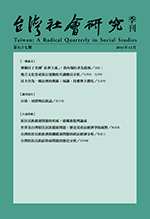
《台灣社會研究季刊》 第97期:

【一般論文】
傳播拉丁美洲「社會主義」:委內瑞拉承先啟後/馮建三(97 民103.12 頁1-62)
委內瑞拉率拉丁美洲政治之先,1999年向左轉,2005 年首度宣告其建設綱領是「二十一世紀社會主義」,智利之後,議會社會主義再次出現;古巴之外,拉美社會主義重新得到發展的機會。本文首先勾勒拉美的六十年左翼政權梗概,尤其是查維茲崛起後迄今的拉美路徑。其次,作者鋪陳這些國家的表現,凸顯最能彰顯社會主義特徵的經濟成果之分配及其成長,古巴而特別是委內瑞拉得到較多介紹與討論, 並對委內瑞拉在草根參與政治及其國際視野與實踐,亦予重點提示, 藉以表明左翼的建設並不只是以經濟為斷。惟古、委與拉美左翼所突出的社會主義路線,僅只是資本主義海洋的島嶼,拉美進步政權的在野保守集團多有美國作為奧援,致使拉美左翼的發展除了必須面對選舉考驗,另得防範與還擊內外右翼路線的肆意攻訐與破壞,特別是委內瑞拉反對勢力與傳媒(曾有的密切)結合程度,世所罕見。就此理解,紐約時報為主的海外傳媒對委內瑞拉的再現,不只涉及傳媒報導真實或評論公正與否,亦且展現了跨國力量對於新興社會主義的火苗之態度。文末總結並提問中國與委內瑞拉等國的關係。
關鍵詞: 委內瑞拉、社會主義、古巴、拉丁美洲、大眾媒體、紐約時報
With Hugo Chavez’s winning the Presidential election in late 1998, Venezuela made the first left-turn politics in Latin America and has since joined by many a countries in this region. In 2005 Chavez proclaimed that ‘21st-century socialism’ is the ideal guiding his politics. For the first time after Chile’s coup, ‘socialism’ is again put back into the political agenda and has created new spaces for Latin Americans to develop her visions of socialism in addition to Cuba’s. Having outlined the checkered path that Ibero-American socialists have undergone during the past six decades, this essay turns to evaluate current left regimes’ performances. The author emphasizes in particular Venezuela’s economic records and her social programmes in this century, in the meantime her participatory politics and internationalism practices are noted so that socialism will not be unduly interpreted in restricted economic ascepts. Though by no means satisfactory, Venezuela has nonetheless had commendable achievements. And yet, Venezuela is just an island moving toward socialism, the capitalist ocean will take and manufacture every opportunity to flood and drown these efforts. To challenge and sabotage the Bolivarian Revolution, Venezuela’s opposition forces have aligned themselves to wage media and economic wars agains Chavistas, with substantial support provided by the US. As such, Venezuela’s revolution as portrayed in the international media, the New York Times as one key example analysed, must have significant political implications. It demonstrates how transnational capitalist forces perceive or wish to put out this emerging socialist flame. The author summarizes and concludes the paper by raising a question relating China to Venezuela.
Keywords: Venezuela, socialism, Cuba, Latin America, mass media, The New York Times
地方文化資產保存運動的共識動員分析:以苗栗護窯運動為借鏡/吳翠松、吳季昕(97 民103.12 頁63-110)
本文欲以苗栗護窯運動為釋例,探討目前台灣文化情境下,地方文資保存運動者在建構認同的過程中,通常提出什麼論述、行動及儀式以形成集體共識?地方政府又是透過何種機制與論述去消解社運者欲喚起的共識認同?窯盟的共識動員過程,又在哪些地方出了問題? 研究結果發現,在拆除古窯前的論述構框交鋒部分,窯盟主打三座窯(包仔窯、四方窯和八卦窯)的稀有性,並籲請苗栗縣政府在原預定的高鐵興建區內成立古窯人文生態博物館,以創造文化觀光雙贏局面。縣府則以審議委員會決議「窯不具稀有性」與辦理都市計畫變更將嚴重影響高鐵苗栗站的「開發」時程反應;在拆窯後,窯盟將論述構框在地方與中央相關官員的究責與質疑文資審議機制的缺失,並要求「原址保留」地下煙道,重建古窯;縣府則強調一切「依法行政」,並依事後補正的審議委員會議決議,將地下煙道「移地」保存。綜觀來看,窯盟共識動員過於強調理性認知層次,缺乏感性情緒層次,難創造動員潛力,另過於重視拆除古窯的究責,缺乏在地互動與議題結合,致使在地民眾投入度不高,再加上文化保存議題本身的理想性,難以製造一般民眾利益參與的誘因,而縣府拆窯迅速,造成後續目標變動與無專業解決方案,亦是造成此文化保存運動難以動員的原因之一。
關鍵詞: 護窯運動、共識動員、地方文化資產保存運動、地方社會運動、構框、苗栗縣政府
This article tried to use the Protection Movement of the Brick Kilns in MiaoLi to be an example to explore the respective consensus mobilization process for actor of local cultural heritage preservation movement and Local Government in contemporary Taiwan situation. In this study , we adopt text analysis and interview to be researchmethods. We analyze 50 news reports , relative government documents and interview 13 participamts of the Protection Movement of Brick Kilins. For analyzing convenience , the whole protection movement of the Brick Kilns was divided into two different phase–before and after demolition. The results showed that before the demolition of the Kilns, the discourse framing of the association for the Protection Movement of the Brick Kilns was focused on the rarity of the Kiln, and call on government to establish the Kiln Museum of human ecology in order to create a win-win situation; then MioLi County Government stressed the Kiln is not a rare cultural heritage through Resolution of the of Cultural Heritage Committee, and the changes of urban planning process will seriously affect the “developmental” schedule of high-speed rail MiaoLi station. After demolition of the kiln, kiln Association’s discourse framed on the illegal and responsibility of the local and central government and appealed to reserve the underground flue pipes according their original place ; MioLi County Government stressed that they are the “administration according to law”, and moved the underground flue pipes to other place. In short, it is too emphasized the rational cognitive level and lacked of emotional level of discourse framing for the Kiln Association in mobilizing consensus to difficult to attract participants; and lack in interactive or combination of issues with local affair , resulting in the low sense of involvement for local people; in addition that kiln body was demolition too quickly by the MioLi County Government to react immediately, all of these were the reasons of failure for this cultural preservation movement .
Keywords: the protection movement of the Brick Kilns, consensus mobilization, local cultural heritage preservation movement, local social movement, framing, MiaoLi County Government
民主作為一種治理的藝術:知識、技藝與主體化/吳彥明(97 民103.12 頁111-174)
傅柯一系列的權力概念,例如知識、規訓、維安、佈署、治理性、主體化,不應僅侷限於性/別、醫學、軍事、殖民體制等這些形式上比較負面的討論,權力經常狡猾地介入與隱藏於我們標示為正面意義的人事物之中,「民主」就是一個免疫的例子。我將著重於「民主作為一種治理的藝術」這個面向,將民主視為一種由知識、技藝與主體化所構成「民主複合體」(democratic complex):首先,民主不只是一種政治菁英擘劃的政治議程,它更是一種確立、劃界與定義如何思考民主的專家/知識體系。其次,民主不只是一種文化,更是一種由治理技藝打造的技術物,它既是治理的手段也是治理的目的。最後,與其說民主的正當性基礎是公民,我們必須將民主視為一種將人民轉化為民主主體的權力投資。
關鍵詞: 民主、治理性、知識、技藝、主體化
The critical concepts in Foucault’s oeuvre, like savoir, discipline, police, deployment, governmentality and subjectification, are usually applied to the analysis of gender, medicine, military or colonial apparatus. Inevitably, however, power insinuate into a variety of fields we labeled as positive. Democracy is indeed the example. In this article, the author tries to elaborate democracy as an art of government, which means democracy is a democratic complex constitued by knowledge, technique and subjectification. First, rather than as the political agenda set by political elites, we should take democracy as the forms of knowledge formulated by expertise that valorize, delimit and certificate the problematics of democracy. Second, more than delineates it as culture, we suppose democracy as an artifact fabricated by governmental techniques. Last, but not least, citizens are more as the democratic subjects invested by democracy than as the legitimacy of democracy.
Keywords: democracy, governmentality, knowledge, technique , subjectification
【調查報告】
自我,尋繹與民族誌/張少強(97 民103.12 頁175-201)
追隨反省性的知識論理念,重檢民族誌的尋繹基礎,本文將以自述方式把筆者的民族誌研究經歷變成研究主題來加以探討。透過自我省思,本文嘗試穿過昔日實證主義的客觀迷思和當今後現代主義的虛無轉向,指出自我可以成為切要的研究主動力(agency),田野研究實屬研究者得以跨越「我-他」差異的有效途徑,既以心省思,也以四肢五官,進行有真實體會的社會探尋。
關鍵詞: 知識、身體、理解、反省性、田野研究
This article offers a self-reflection upon a field research in order to advance epistemological and methodological insights for ethnographic practice. Beginning with a critical review of the positivist legacy and postmodern turn, the discussion points to the making of ethnographic self into a pertinent agent in conducting social inquiry. This article at the end demonstrates that field research is of a unique strength for researcher to transcend the self-other dichotomy in understanding culture not only by dialogical communication, but also vicariously empathy from mind and body experience.
Keywords: Knowledge, body, understanding, reflexivity, fieldwork
【左異聲響】
原住民族健康問題的形成:建構新批判論述
編按/陳美霞(97 民103.12 頁203-208)
世界及台灣原住民族健康問題:歷史及政治經濟學的視野/陳美霞(97 民103.12 頁209-246)
台灣原住民族飲酒相關健康問題的政治經濟分析/陳慈立(97 民103.12 頁247-282)
台灣原住民族結核病問題的歷史分析/高瑋蘋(97 民103.12 頁283-314)

